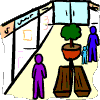9.16 Opening hours in German-speaking countries
A gradual relaxation
 Ever since the 1950's, shop opening hours in Germany, Austria and Switzerland have been among the most restricted in Europe. Germany's draconian law on opening hours (das Ladenschlussgesetz) ensured that stores remained closed after 1800 on weekdays and 1400 on Saturdays. Shops were allowed to remain open two longer on one Saturday every month, on a day called "the long Saturday" (der lange Samstag). Ever since the 1950's, shop opening hours in Germany, Austria and Switzerland have been among the most restricted in Europe. Germany's draconian law on opening hours (das Ladenschlussgesetz) ensured that stores remained closed after 1800 on weekdays and 1400 on Saturdays. Shops were allowed to remain open two longer on one Saturday every month, on a day called "the long Saturday" (der lange Samstag).
In June 1996, the German Parliament finally gave in to pressure from both business and consumers
and relaxed (das Ladenschlussgesetz). Starting from November 1 that year, shops were allowed to remain open until eight o'clock in the evening on weekdays and until four o'clock on Saturdays. They are only allowed to open later than that on Thursdays when some city centre shops choose to remain open until 20.30. In the weeks leading up to Christmas however, shops can open until 18:00 on Saturdays.
Whilst there is intense pressure from customers to extend opening hours still further, Germany's trade unions are unwilling to give way. And while it makes sense for businesses in major cities like Berlin to extend opening hours (Öffnungszeiten), many shops in towns and villages have found that longer opening hours does not necessarily mean more turnover, and have gone back to the old opening hours for Thursdays and Saturdays.
 All of which still means that if you run out of fresh milk on Sundays, then you are out of luck. You will have to go to the station or airport where fresh goods can be sold on Sundays. At kiosks and petrol station shops (der Tankstellenshop), you will find durable items such as long-life milk, cold drinks, sweets etc. Flower shops usually open for a couple of hours around lunchtime on Sundays and cake shops (die Konditorei) are allowed to ensure that everyone can have a piece of fresh gateau at the Sunday afternoon coffee and cake (Kaffee und Kuchen) sessions. Occasionally department stores, particularly furniture stores, open on a Sunday for people to go and look and get advice - but they are not allowed to buy things. These Sundays are referred to as open days (der Tag der offenen Tür). All of which still means that if you run out of fresh milk on Sundays, then you are out of luck. You will have to go to the station or airport where fresh goods can be sold on Sundays. At kiosks and petrol station shops (der Tankstellenshop), you will find durable items such as long-life milk, cold drinks, sweets etc. Flower shops usually open for a couple of hours around lunchtime on Sundays and cake shops (die Konditorei) are allowed to ensure that everyone can have a piece of fresh gateau at the Sunday afternoon coffee and cake (Kaffee und Kuchen) sessions. Occasionally department stores, particularly furniture stores, open on a Sunday for people to go and look and get advice - but they are not allowed to buy things. These Sundays are referred to as open days (der Tag der offenen Tür).
Under Austrian law, stores may stay open from 0600 until 1930 on work days. In tourist areas they are allowed to conduct business until 2000, even on Sundays. In Germany, Austria and Switzerland however, pub opening hours are much more relaxed than in Britain - in general they open at around 11 a.m. and stay open till midnight or beyond.
Sales
You can get particularly good bargains in the summer sales (der Sommerschlussverkauf (SSV)) and winter sales (der Winterschlussverkauf (WSV)). Strictly speaking the sales only begin on the last Monday in July and the last Monday in January, selling goods left over from the previous season at considerably reduced rates. Just look for the German word for "reduced" - reduziert. However, most shops start offering reduced-price articles and special offers long before the official date so that all that is left on the shelves when the real sales begin are often sub-standard goods specially manufactured for the sales.

 Chapter 9: Exercises Chapter 9: Exercises
 Nach oben Nach oben
 Print This Page Print This Page
|